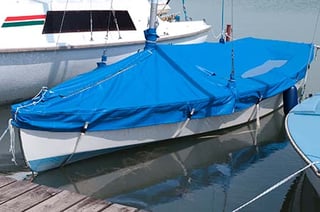
If your pre-owned boat did not come with a cover or the existing one isn’t up to par, you’ll want to invest or upgrade soon. Anyone who has dealt with a less-than-waterproof boat cover will likely prioritize finding a fully waterproof option, but of course, these covers have advantages and disadvantages.
Definition
Before considering the pros and cons of fully waterproof boat covers, it’s important to know what “fully waterproof” really means. Lots of fabric manufacturers say their products are waterproof but often they really mean water resistant, or sometimes water repellent. In order to be truly waterproof, a boat cover must let no water through at all, which requires some very specific characteristics. There are a few different levels of waterproofing, and the category a product falls into is determined mostly by its fabric type and whether it was designed to be waterproof.
Natural fabrics can’t really be waterproof. Even if you apply waterproofing materials or coatings to them, they will always be moisture resistant at best. Synthetic fabrics like polyester and acrylic can be waterproofed effectively for a short period of time, but once the waterproofing substance wear off, your cover (and the part of your boat being protected) is no longer kept dry. Fabrics like Herculite’s vinyl-based polyester composite synthetic fibers are genuinely waterproof because waterproofing materials are literally in the formula. Unlike other fabrics, these synthetic covers don’t require seams where water can get through even if a product has recently been coated in waterproofing sealant.
Pros
There are many advantages to buying a waterproof boat cover. First, it provides full protection for everything it’s covering. As long as it’s securely and properly fastened, a waterproof boat cover won’t allow any water to seep through to the carpet, seats or belongings that may be stored under it. This is especially important if it you live in an area with regular rainfall and you don’t use your boat frequently. If water penetrates the cover, leaving your furniture or carpeting trapped in moisture for a few days, you might have to make costly repairs to that whole portion of the boat.
Another important advantage to fully waterproof boat covers is the protection against mold and mildew. When boat covers that aren't fully waterproof become saturated, and don't dry out thoroughly, mold and mildew can start to accumulate. Cleaning and preventing the spread of fungus can be a huge hassle, especially when dealing with a very large piece of fabric.
Cons
Compared to the many advantages of having a fully waterproof boat cover, the disadvantages are somewhat insignificant. The main disadvantage is a purely aesthetic issue. While composite synthetic fabrics aren't particularly unpleasant to look at, many people do prefer the look of acrylic boat covers.
One other disadvantage, dictated mostly by the market, is that fully waterproof boat covers can be somewhat difficult to find. It’s important to be sure you find a manufacturer or seller that values the same things you do. Make sure to finalize a list of non-negotiables before you start shopping so you know what to look for.
When it comes to marine fabrics, laminate provides several clear benefits. Learn more by checking out our latest eBook, "Why Laminated Marine Vinyl Fabrics Offer Advantages Over Coated Marine Vinyl Fabrics".
